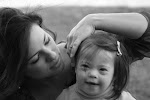One day last fall, Bridget and I went shopping while the kids were at school. She was extra loud in her stroller that day--not fussy, just making all kinds of noise. The store was virtually empty, so I was sure we weren't bothering anyone.
I wasn't surprised when we went up to check out and the clerk said with a smile, "Boy, someone sure has a lot to say today!" I smiled back, "Yes, she does." Without missing a beat, she replied, "My uncle was a Down's. He died."
I was more than stunned, and I'm pretty sure my mouth was hanging wide open because she continued quickly, "Oh, he was like 65 years old when he died a few years ago. We all loved him a lot."
I've seen this woman many times at the same store. She's always friendly, and I know she didn't intend to seem insensitive...more likely the opposite.
I'm always amazed to hear things like "He was a Down's"--and I hear variations of that statement often. It always stings a little, but not like it did when Bridget was small, and when I wasn't sure what to make of many things people said about her.
The woman in the store probably had no idea how her statement made me feel, as most people who use "outdated language" do not realize what they are really saying.
I 'd love for others to begin to understand that disability is natural, and that all people (regardless of appearance or ability) should be treated with respect and dignity.
Down syndrome is a medical diagnosis--a condition--that is part of a person at conception. Referring to Bridget as "a Down's," or as "a Down syndrome child," is loaded with stereotype and inherent discrimination, even if not intended. It suggests that Ds is the most important part of Bridget, that somehow she is Down syndrome.
Down syndrome is not a disease. Bridget does not "suffer" from it. She is not a "Down's", a "Down's baby", or a "Down syndrome child". She is a child...a beautiful and amazing little girl with an extra chromosome. She has Down syndrome.
The current thought in the United States is that "Down syndrome", or "Ds" (both with a lowercase /s/ in syndrome), is correct. "Down's syndrome" is not. To shorten, I've heard some people say "She has Down". I don't know if that is considered "correct" or not...but I think it sounds strange.
Here's a link to Kids Together, Inc., a non-profit organization which provides information and resources for children and adults with disabilities--where you can find information on People First Language among other important topics.
All Feeling Better
14 years ago











Lisa, I totally agree with you. "All people (regardless of appearance or ability) should be treated with respect and dignity". Bridget is Bridget, your beautiful and lovely daughter, she was born with an extra chromosome and her potential is infinite!!!.
ReplyDelete